
The post mill is the earliest type of European windmill. Its defining feature is that the whole body of the mill that houses the machinery is mounted on a single central vertical post. The vertical post is supported by four quarter bars. These are struts that steady the central post.
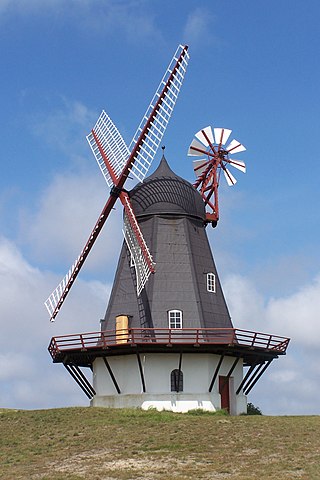
The smock mill is a type of windmill that consists of a sloping, horizontally weatherboarded, thatched, or shingled tower, usually with six or eight sides. It is topped with a roof or cap that rotates to bring the sails into the wind. This type of windmill got its name from its resemblance to smocks worn by farmers in an earlier period.
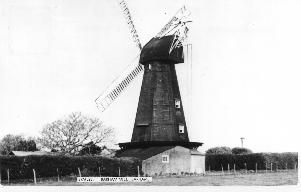
Black Mill or Barham Downs Mill was a smock mill at Barham, Kent, England which was accidentally burnt down in 1970 while under restoration.
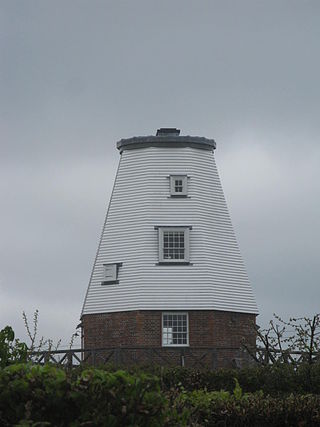
Beacon Mill is a Grade II listed smock mill in Benenden, Kent, England which is in need of restoration. The mill has been out of use since 1923 and is privately owned.

Bidborough Mill is a Grade II listed, house converted tower mill west of Bidborough, Kent, England. It is now incorporated into a housing development called Mill Court, on the south side of the B2176 Penshurst Road.
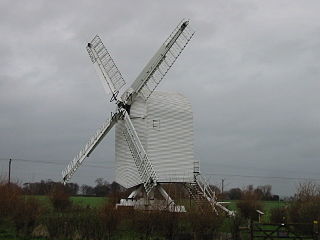
Chillenden windmill is a grade II* listed open-trestle post mill north of Chillenden, Kent, England. It is the last post mill built in Kent.

Upper Mill is a Grade II listed house converted smock mill in Eastry, Kent, England. It was built in the mid eighteenth century.

Herne Windmill is a Grade I listed smock mill in Herne, Kent, England, that was built in 1789.

West Kingsdown Windmill is a Grade II listed smock mill in West Kingsdown, Kent, England, that was built in the early nineteenth century at Farningham and moved to West Kingsdown in 1880. It is the survivor of a pair of windmills.

Draper's Windmill or Old Mill is a Grade II listed Smock mill in Margate, Kent, England that was built in 1845.

Ripple Windmill is a Grade II listed smock mill in Ringwould, Kent, England, that was built in Drellingore and moved to Ringwould in the early nineteenth century. Having been stripped of machinery and used as a television mast, it has been restored as a working windmill.

Sarre Windmill is a Grade II listed smock mill in Sarre, Kent, England, that was built in 1820. Formerly restored and working commercially, the mill is now closed.
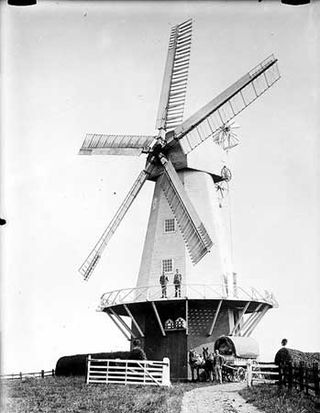
Ringle Crouch Green Mill is a smock mill in Sandhurst, Kent, England, that was demolished to base level in 1945, and now has a new smock tower built on it as residential accommodation and an electricity generator.

St Leonard's mill was a post mill at Winchelsea, East Sussex, England which was blown down in the Great Storm of 1987.

East Wittering Windmill is a grade II listed tower mill at East Wittering, Sussex, England which is derelict.

Lowfield Heath Windmill is a Grade II listed post mill at Charlwood, Surrey, England, which has been restored to working order.
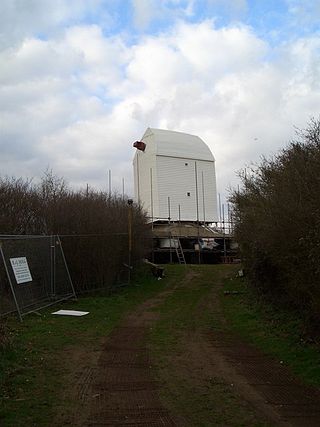
Drinkstone Windmills are a pair of windmills at Drinkstone, Suffolk, England. They consist a post mill and a smock mill. The post mill is Grade I listed and the smock mill is Grade II* listed. The mills were known as Clover's Mills as they were always worked by the Clover family.
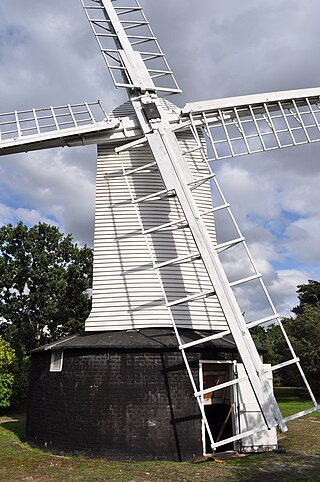
Holton Windmill is a Grade II listed post mill at Holton, Suffolk, England which has been preserved as a landmark.

Upthorpe Mill is a Grade II* listed post mill and scheduled monument at Stanton, Suffolk, England, which has been restored to working order.

Cromer Windmill, restored in four stages between 1967 and 1998, is a Grade II* listed post mill at Cromer, Ardeley, Hertfordshire, England.




















